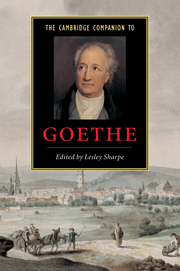Book contents
- Frontmatter
- Introduction
- 1 The world Goethe lived in
- 2 Goethe the writer and literary history
- 3 Goethe the poet
- 4 Goethe the dramatist
- 5 Faust
- 6 Weimar Classicism
- 7 Goethe and the Weimar theatre
- 8 Goethe’s prose fiction
- 9 Autobiographical writings
- 10 In defence of experience
- 11 Goethe and gender
- 12 Goethe and the visual arts
- 13 Goethe and the political world
- 14 Religion and philosophy
- 15 Reception in Germany and abroad
- A guide to further reading
- Index
1 - The world Goethe lived in
Germany and Europe, 1750–1830
Published online by Cambridge University Press: 28 May 2006
- Frontmatter
- Introduction
- 1 The world Goethe lived in
- 2 Goethe the writer and literary history
- 3 Goethe the poet
- 4 Goethe the dramatist
- 5 Faust
- 6 Weimar Classicism
- 7 Goethe and the Weimar theatre
- 8 Goethe’s prose fiction
- 9 Autobiographical writings
- 10 In defence of experience
- 11 Goethe and gender
- 12 Goethe and the visual arts
- 13 Goethe and the political world
- 14 Religion and philosophy
- 15 Reception in Germany and abroad
- A guide to further reading
- Index
Summary
Goethe occupied a position that often placed him closer to historical events than he might have liked and forced him to come to terms with them, not only personally, but above all for the sake of Duke Carl August (1757-1828) and the small German state of Saxe-Weimar-Eisenach that Goethe served throughout his adult life. Thus Goethe was not just a man of letters, but also a man of affairs; he was acquainted with, met - not least through his regular sojourns at the Bohemian spas - or had dealings with an impressive number of the leading players of his age ranging from Prussian kings and statesmen to Napoleon Bonaparte, Czar Alexander I of Russia and Prince Metternich, the architect of Restoration Europe.
- Type
- Chapter
- Information
- The Cambridge Companion to Goethe , pp. 6 - 22Publisher: Cambridge University PressPrint publication year: 2002

